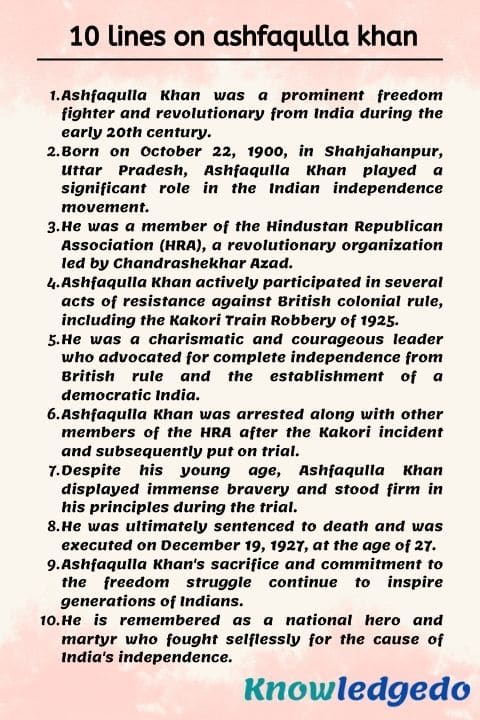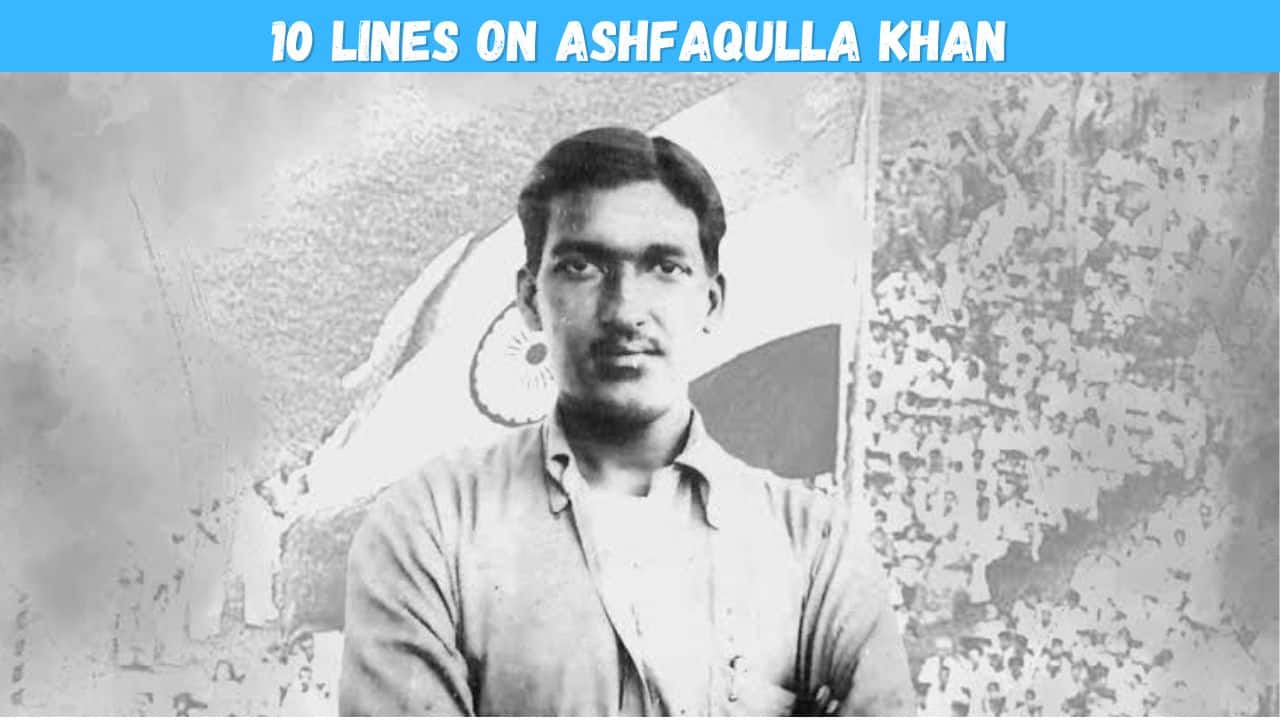Today, we are sharing 10 lines on Ashfaqulla Khan in English. This article can help students who are looking for information about 10 lines on Ashfaqulla Khan. This Lines is very simple and easy to remember. The level of these Lines is moderate so any student can write on this topic.
This article is generally useful for class 1,class 2,class 3,class 4,class 5,class 6,class 7,class 8,class 9,class 10,class 11,class 12
10 lines on Ashfaqulla Khan
1) Ashfaqulla Khan was a prominent freedom fighter and revolutionary from India during the early 20th century.
2) Born on October 22, 1900, in Shahjahanpur, Uttar Pradesh, Ashfaqulla Khan played a significant role in the Indian independence movement.
3) He was a member of the Hindustan Republican Association (HRA), a revolutionary organization led by Chandrashekhar Azad.
4) Ashfaqulla Khan actively participated in several acts of resistance against British colonial rule, including the Kakori Train Robbery of 1925.
5) He was a charismatic and courageous leader who advocated for complete independence from British rule and the establishment of a democratic India.
6) Ashfaqulla Khan was arrested along with other members of the HRA after the Kakori incident and subsequently put on trial.
7) Despite his young age, Ashfaqulla Khan displayed immense bravery and stood firm in his principles during the trial.
8) He was ultimately sentenced to death and was executed on December 19, 1927, at the age of 27.
9) Ashfaqulla Khan’s sacrifice and commitment to the freedom struggle continue to inspire generations of Indians.
10) He is remembered as a national hero and martyr who fought selflessly for the cause of India’s independence.

5 lines on Ashfaqulla Khan
1) Ashfaqulla Khan was an influential freedom fighter and revolutionary from India.
2) He was a member of the Hindustan Republican Association (HRA) and actively participated in the Indian independence movement.
3) Ashfaqulla Khan played a significant role in the Kakori Train Robbery of 1925, a symbolic act of resistance against British rule.
4) He faced a trial and was sentenced to death for his involvement in revolutionary activities.
5) Ashfaqulla Khan’s sacrifice and dedication to the cause of India’s independence make him a revered national hero.
FAQ
Answer: Ashfaqulla Khan was a prominent freedom fighter and revolutionary from India. He was a member of the Hindustan Republican Association (HRA) and actively participated in the Indian independence movement. He played a significant role in the Kakori Train Robbery of 1925, a symbolic act of resistance against British rule.
Answer: Ashfaqulla Khan’s involvement in the Kakori Train Robbery led to his arrest. The British authorities took swift action to apprehend those responsible for the incident, resulting in Khan and other members of the HRA being arrested and put on trial.
Answer: Ashfaqulla Khan was found guilty and sentenced to death for his participation in revolutionary activities. Despite his young age, he displayed immense bravery and stood firm in his principles during the trial.
Answer: Ashfaqulla Khan was executed on December 19, 1927. He was hanged to death for his role in the revolutionary movement, becoming a martyr for the cause of India’s independence.
Answer: Ashfaqulla Khan is remembered as a national hero and martyr who fought selflessly for the cause of India’s independence. His sacrifice and dedication continue to inspire generations of Indians
Answer: Yes, there are several memorials and commemorations dedicated to Ashfaqulla Khan across India. These include statues, plaques, and institutions named after him, serving as a reminder of his contribution to the freedom struggle.
